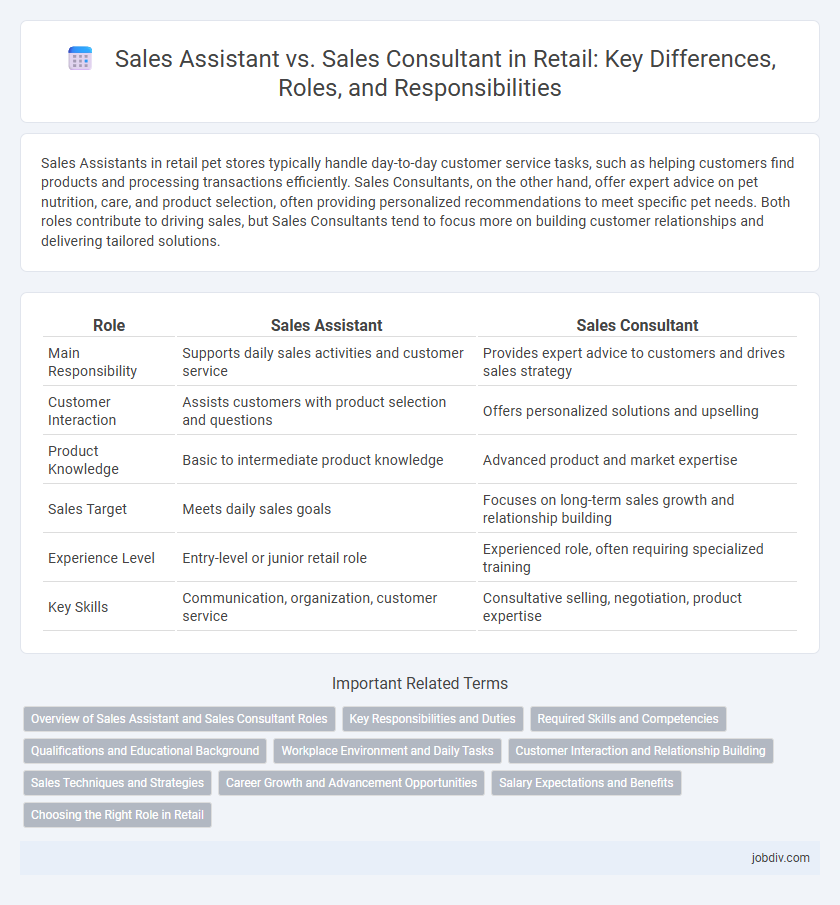Sales Assistants in retail pet stores typically handle day-to-day customer service tasks, such as helping customers find products and processing transactions efficiently. Sales Consultants, on the other hand, offer expert advice on pet nutrition, care, and product selection, often providing personalized recommendations to meet specific pet needs. Both roles contribute to driving sales, but Sales Consultants tend to focus more on building customer relationships and delivering tailored solutions.
Table of Comparison
| Role | Sales Assistant | Sales Consultant |
|---|---|---|
| Main Responsibility | Supports daily sales activities and customer service | Provides expert advice to customers and drives sales strategy |
| Customer Interaction | Assists customers with product selection and questions | Offers personalized solutions and upselling |
| Product Knowledge | Basic to intermediate product knowledge | Advanced product and market expertise |
| Sales Target | Meets daily sales goals | Focuses on long-term sales growth and relationship building |
| Experience Level | Entry-level or junior retail role | Experienced role, often requiring specialized training |
| Key Skills | Communication, organization, customer service | Consultative selling, negotiation, product expertise |
Overview of Sales Assistant and Sales Consultant Roles
Sales Assistants primarily support customers by managing product inquiries, processing transactions, and maintaining store appearance to enhance the retail environment and customer satisfaction. Sales Consultants engage in deeper customer interactions, offering tailored product advice, building client relationships, and driving sales through expert knowledge and personalized service. Both roles are essential in retail, with Sales Consultants focusing on consultative selling strategies and Sales Assistants emphasizing operational support and basic customer service.
Key Responsibilities and Duties
Sales Assistants primarily focus on customer service, inventory management, and processing transactions, ensuring a seamless shopping experience. Sales Consultants emphasize personalized customer interactions, product demonstrations, and tailored sales strategies to meet specific client needs and drive revenue growth. Both roles require strong communication skills and product knowledge, but Sales Consultants have a more strategic and advisory function within the retail environment.
Required Skills and Competencies
Sales Assistants require strong communication skills, basic product knowledge, and the ability to handle transactions efficiently, ensuring smooth customer interactions. Sales Consultants need advanced interpersonal skills, expertise in product features, and a consultative approach to tailor solutions to customer needs and drive higher sales. Both roles demand attention to detail, problem-solving abilities, and a customer-focused attitude to enhance the retail experience.
Qualifications and Educational Background
Sales Assistants typically require a high school diploma or equivalent, with skills in customer service and basic product knowledge, emphasizing hands-on experience over formal education. Sales Consultants often possess higher qualifications such as a bachelor's degree in marketing, business, or related fields, alongside specialized training in sales strategies and client relationship management. Advanced certifications in sales techniques and communication further distinguish Sales Consultants by enhancing their ability to analyze customer needs and deliver tailored solutions.
Workplace Environment and Daily Tasks
Sales Assistants typically work in fast-paced retail environments, managing inventory, assisting customers with product selection, and handling transactions at the point of sale. Sales Consultants often operate in specialized or high-end retail settings, providing personalized product advice, conducting demonstrations, and developing client relationships to drive sales. Both roles require strong communication skills, but Sales Consultants focus more on customer engagement and tailored solutions, while Sales Assistants emphasize efficient transaction processing and store maintenance.
Customer Interaction and Relationship Building
Sales Assistants primarily handle direct customer interactions by addressing immediate needs, providing product information, and facilitating smooth transactions to enhance the shopping experience. Sales Consultants engage in deeper relationship building through personalized consultations, understanding customer preferences, and recommending tailored solutions that drive long-term loyalty. Both roles contribute to revenue growth, but Sales Consultants focus more on strategic customer retention and value creation.
Sales Techniques and Strategies
Sales Assistants primarily focus on executing basic sales techniques such as product knowledge communication, customer service, and transaction handling to support store operations. Sales Consultants employ advanced sales strategies that include personalized customer needs analysis, upselling, and consultative selling to build long-term client relationships and maximize revenue. Both roles contribute to retail success but differ in skill depth and strategic customer engagement.
Career Growth and Advancement Opportunities
Sales Consultants often experience faster career growth than Sales Assistants due to their advanced product knowledge, client management skills, and ability to provide tailored solutions. Sales Consultants typically have more opportunities for advancement into roles such as Sales Manager, Business Development Executive, or Product Specialist. In contrast, Sales Assistants primarily support daily operations and have limited pathways to higher positions without additional training or experience.
Salary Expectations and Benefits
Sales Assistants typically earn a base salary ranging from $25,000 to $35,000 annually, while Sales Consultants can expect higher earnings between $40,000 and $60,000, reflecting their advanced product knowledge and customer advisory roles. Benefits for Sales Consultants often include performance bonuses, commission structures, and enhanced healthcare plans, contrasting with more basic packages for Sales Assistants. Employers invest more in Sales Consultants due to their direct impact on revenue growth and client relationship management.
Choosing the Right Role in Retail
Sales assistants typically handle transactional tasks, customer inquiries, and inventory management, making them ideal for entry-level positions focused on support and daily operations. Sales consultants prioritize relationship building, product expertise, and personalized solutions, fitting roles that require advanced communication and strategic selling skills. Choosing the right role depends on career goals, desired customer interaction level, and the complexity of product knowledge needed in the retail environment.
Sales Assistant vs Sales Consultant Infographic

 jobdiv.com
jobdiv.com